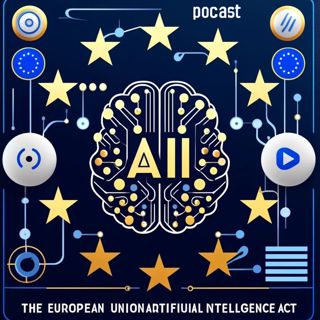
EU AI Act Reshapes the Tech Landscape: A Glimpse into the Future
As I sit here in my Brussels apartment, sipping my morning espresso and scrolling through the latest tech news, I can't help but marvel at the seismic shifts happening in the AI landscape. It's March 16, 2025, and the European Union's Artificial Intelligence Act has been in partial effect for just over a month. The tech world is abuzz with activity, and I feel like I'm watching history unfold in real-time.Last month, on February 2nd, the first phase of the EU AI Act came into force, banning AI systems deemed to pose "unacceptable risks." It's fascinating to see how quickly companies have had to pivot, especially those dealing with social scoring systems or emotion recognition in workplaces. I've heard through the grapevine that some startups in Berlin and Paris have had to completely overhaul their business models overnight.The European AI Office has been working overtime, issuing guidelines left and right. Just last week, they published a comprehensive set of rules for general-purpose AI models, and let me tell you, it's a game-changer. The tech giants are scrambling to ensure compliance, and I've seen a flurry of job postings for "AI Ethics Officers" and "Compliance Specialists" across LinkedIn.What's really caught my attention is the ongoing development of the Code of Practice for general-purpose AI models. The AI Office is facilitating its creation, and it's set to become the gold standard for demonstrating compliance with the Act. I've been following the updates religiously, and it's like watching a high-stakes chess match between regulators and tech innovators.The extraterritorial scope of the Act is causing quite a stir in Silicon Valley. I spoke with a friend at a major tech company last night, and she told me they're completely restructuring their AI development processes to align with EU standards. It's clear that the EU is setting the global pace for AI regulation, much like it did with GDPR.As we approach the next major deadline in August, when provisions on general-purpose AI models and most penalties will take effect, there's a palpable tension in the air. Companies are racing against the clock to ensure compliance, and I've heard whispers of some cutting-edge AI projects being put on hold until the regulatory landscape becomes clearer.It's an exhilarating time to be in the tech sector, watching as this groundbreaking legislation reshapes the future of AI. As I finish my coffee and prepare for another day of navigating this brave new world, I can't help but wonder: how will the EU AI Act continue to evolve, and what unforeseen consequences might it bring? Only time will tell, but one thing's for certain – the AI revolution is here, and it's being carefully regulated.
16 Maalis 2min

Seismic Shifts in Tech as EU AI Act Takes Effect: Navigating the New Regulatory Landscape
As I sit here in my Brussels apartment on this chilly March morning, I can't help but reflect on the seismic shifts we've experienced since the EU AI Act came into force. It's been just over a month since the first provisions of this groundbreaking legislation took effect, and the tech world is still reeling from the impact.The ban on unacceptable risk AI practices, which kicked in on February 2nd, has sent shockwaves through the industry. Companies are scrambling to ensure their AI systems don't fall foul of the new rules. Just last week, a major social media platform had to hastily disable its emotion recognition feature in the EU, realizing it violated the Act's prohibitions.But it's not all doom and gloom. The AI literacy requirements are sparking a renaissance in tech education. I've lost count of the number of AI ethics workshops and crash courses popping up across the continent. It's heartening to see organizations taking these obligations seriously, recognizing that an AI-literate workforce is now a necessity, not a luxury.The European AI Office, led by the formidable Lucilla Sioli, has been working overtime to provide clarity on the Act's implementation. Their recent guidelines on defining AI systems have been a godsend for companies grappling with the new regulatory landscape. And let's not forget the AI Pact, a voluntary initiative that's gaining traction as firms seek to demonstrate their commitment to responsible AI development.Of course, it's not all smooth sailing. The looming August deadline for general-purpose AI model providers is causing no small amount of anxiety. The race is on to develop the Code of Practice that will help these providers navigate their new obligations. I've heard whispers that some of the tech giants are pushing back, arguing that the timeline is too aggressive.Meanwhile, the global ripple effects of the EU AI Act are fascinating to observe. Countries from Brazil to Japan are closely watching how this experiment in AI regulation unfolds. Some are even using it as a blueprint for their own legislative efforts.As we look ahead to the full implementation in August 2026, one thing is clear: the EU AI Act is reshaping the technological landscape in ways we're only beginning to understand. It's an exciting, if somewhat daunting, time to be working in tech. As someone deeply embedded in this world, I can't wait to see how it all unfolds.
14 Maalis 2min

Seismic Shifts in the AI Landscape: The EU AI Act's Profound Impact
As I sit here in my Brussels apartment, sipping my morning espresso and scrolling through the latest tech news, I can't help but marvel at the seismic shifts happening in the AI landscape. It's March 12, 2025, and the EU AI Act has been in partial effect for just over a month now. The buzz around this groundbreaking legislation is palpable, and as a tech journalist, I'm right in the thick of it.Last week, I attended a webinar hosted by the European Commission's AI Office, where they unpacked the nuances of the AI literacy obligation under Article 4. It's fascinating to see how companies are scrambling to ensure their staff are up to speed on AI systems. Some are relying on off-the-shelf training programs, while others are developing bespoke solutions tailored to their specific AI applications.The ban on certain AI practices has sent shockwaves through the tech industry. Just yesterday, I interviewed a startup founder who had to pivot their entire business model after realizing their emotion recognition software for workplace monitoring fell afoul of the new regulations. It's a stark reminder of the Act's far-reaching implications.But it's not all doom and gloom. The AI Pact, a voluntary initiative launched by the Commission, is gaining traction. I spoke with Laura De Boel from Wilson Sonsini's data privacy practice, who's been advising clients on early compliance. She's seeing a surge in companies eager to demonstrate their commitment to ethical AI, viewing it as a competitive advantage in the European market.The geopolitical ramifications are equally intriguing. With the US taking a more hands-off approach to AI regulation, and China pursuing its own path, the EU is positioning itself as the global standard-setter for AI governance. It's a bold move, and one that's not without its critics.I've been particularly interested in the debate around general-purpose AI models. The EU's approach of imposing transparency requirements and potential systemic risk assessments on these models is unprecedented. It's sparked intense discussions in tech circles about innovation, competitiveness, and the balance between regulation and progress.As I wrap up my morning routine and prepare to head out for an interview with a member of the European Artificial Intelligence Board, I can't help but feel a sense of excitement. We're witnessing the birth of a new era in technology regulation, and the ripple effects will be felt far beyond Europe's borders. The EU AI Act is more than just a piece of legislation – it's a bold statement about the kind of future we want to build with AI. And as someone on the front lines of reporting this transformation, I wouldn't have it any other way.
12 Maalis 2min

"Seismic Shifts in EU's AI Landscape as Landmark Legislation Takes Effect"
As I sit here in my Brussels apartment on this chilly March morning, I can't help but reflect on the seismic shifts we've seen in the AI landscape over the past few weeks. The EU AI Act, that groundbreaking piece of legislation that entered into force last August, has finally started to bare its teeth.Just over a month ago, on February 2nd, we saw the first real-world impact of the Act as its ban on certain AI practices came into effect. No more emotion recognition systems in the workplace or education settings. No more social scoring. It's fascinating to see how quickly companies have had to pivot, especially those relying on AI for recruitment or employee monitoring.But what's really caught my attention is the flurry of activity from the European AI Office. They've been working overtime to clarify the Act's more ambiguous aspects. Just last week, they released a set of guidelines on AI literacy, responding to the requirement that came into force alongside the ban. It's a valiant attempt to ensure that everyone from C-suite executives to frontline workers has a basic understanding of AI systems.The tech corridors are buzzing with speculation about the next phase of implementation. August 2nd looms large on everyone's calendar. That's when the provisions on general-purpose AI models kick in. OpenAI, Anthropic, and their ilk are scrambling to ensure compliance. The codes of practice promised by the European Commission can't come soon enough for these companies.What's particularly intriguing is how this is playing out on the global stage. The EU has once again positioned itself as a regulatory trendsetter. I've been following reports from Washington and Beijing closely, and it's clear they're watching the EU's moves with keen interest. Will we see similar legislation elsewhere? It seems inevitable.But it's not all smooth sailing. There's been pushback, particularly from smaller AI startups who argue that the compliance burden is stifling innovation. The recent open letter from a coalition of EU-based AI companies to Commissioner Thierry Breton highlighted these concerns vividly.As we approach the midpoint of 2025, the AI landscape in Europe is undoubtedly transforming. The full impact of the EU AI Act is yet to be felt, but its influence is already undeniable. From the corridors of power in Brussels to tech hubs in Berlin and Paris, there's a palpable sense that we're witnessing history in the making. The next few months promise to be a fascinating period as we continue to navigate this brave new world of regulated AI.
10 Maalis 2min

Seismic Shift in EU AI Landscape: Regulation, Innovation, and Global Implications
It's been a whirlwind few weeks since the EU AI Act's first major provisions kicked in on February 2nd. As I sit here in my Brussels apartment, sipping my morning espresso and scrolling through the latest tech headlines, I can't help but marvel at how quickly the AI landscape is shifting beneath our feet.The ban on "unacceptable risk" AI systems has sent shockwaves through the tech industry. Just last week, I attended a panel discussion where representatives from major AI companies were scrambling to interpret the nuances of Article 5. The prohibition on emotion recognition systems in workplaces has been particularly contentious, with HR tech startups frantically pivoting their products.But it's not all doom and gloom. The AI literacy requirements have sparked a fascinating dialogue about digital competence in the 21st century. Universities across Europe are rushing to develop new curricula, and I've seen a surge in AI ethics workshops popping up in corporate settings.The geopolitical implications are impossible to ignore. China's recent announcement of its own AI regulatory framework seems like a direct response to the EU's leadership in this space. Meanwhile, across the Atlantic, the US Congress is facing mounting pressure to follow suit with federal AI legislation.Yesterday, I had a fascinating conversation with Dragos Tudorache, one of the key architects of the EU AI Act. He emphasized that while the February 2nd milestone was significant, it's just the beginning. The real test will come in August when the governance rules for general-purpose AI models kick in.Speaking of general-purpose AI, the race to develop EU-compliant large language models is heating up. OpenAI's recent partnership with a consortium of European research institutions to create a "GPT-EU" is a clear sign that even Silicon Valley giants are taking the Act seriously.But not everyone is thrilled with the pace of change. Just this morning, I received a press release from a coalition of European startups arguing that the Act's compliance burden is stifling innovation. They're calling for a more nuanced approach that doesn't treat all AI systems with the same broad brush.As we approach the next major deadline in May for the release of AI governance codes of practice, the tension between regulation and innovation is palpable. The European AI Office is under immense pressure to strike the right balance.One thing's for sure: the EU AI Act has catapulted Europe to the forefront of the global AI governance conversation. As I prepare for another day of interviews and policy briefings, I can't help but feel we're witnessing a pivotal moment in the history of technology regulation. The next few months will be crucial in determining whether the EU's vision for "trustworthy AI" becomes a global standard or a cautionary tale.
9 Maalis 2min

EU AI Act Sparks Seismic Shifts Across the Continent
As I sit here in my Brussels apartment, sipping my morning espresso on March 7, 2025, I can't help but marvel at the seismic shifts the EU AI Act has triggered across the continent. It's been just over a month since the first provisions came into effect, and already the tech landscape feels dramatically altered.The ban on unacceptable risk AI systems, which kicked in on February 2, sent shockwaves through Silicon Valley and beyond. I've heard whispers of frantic meetings in corporate boardrooms as companies scramble to ensure compliance. Just yesterday, a friend at a major tech firm confided that they had to scrap an entire facial recognition project overnight.But it's not all doom and gloom. The AI literacy requirements have sparked a renaissance in tech education. Universities are rushing to launch new courses, and I've seen a proliferation of AI bootcamps popping up in every major European city. It's as if the entire continent has collectively decided to upskill.The European AI Office has been working overtime, churning out guidance documents and codes of practice. Their recent clarification on the definition of AI systems was a godsend for many companies teetering on the edge of compliance. I spent hours poring over it, marveling at the nuanced approach they've taken.Of course, not everyone is thrilled. I attended a tech conference in Berlin last week where the debate over the Act's impact on innovation was fierce. Some argued it would stifle progress, while others insisted it would lead to more responsible and trustworthy AI development. The jury's still out, but the passion on both sides was palpable.The global ripple effects are fascinating to observe. Countries from Canada to South Korea are closely watching the EU's approach, with many considering similar legislation. It's clear that Brussels has set the gold standard for AI regulation, much like it did with GDPR.As we approach the next major milestone in August, when rules for general-purpose AI models come into play, there's a palpable sense of anticipation in the air. Will tech giants like OpenAI and Google be able to adapt their large language models in time? The clock is ticking.Amidst all this change, one thing is certain: the EU AI Act has fundamentally altered the trajectory of artificial intelligence development. As I gaze out at the Brussels skyline, I can't help but feel we're witnessing the dawn of a new era in tech regulation. It's a brave new world, and we're all along for the ride.
7 Maalis 2min

EU AI Act Sparks Seismic Shifts in Tech Landscape
As I sit here in my Brussels apartment on March 5, 2025, I can't help but marvel at the seismic shifts the EU AI Act has triggered in just a few short weeks. It's been a month since the first phase of implementation kicked in, and the tech landscape is already transforming before our eyes.The ban on unacceptable-risk AI systems has sent shockwaves through the industry. Social scoring algorithms and real-time biometric identification systems in public spaces have vanished overnight. It's surreal to walk down the street without that nagging feeling of being constantly analyzed and categorized.But it's not just about what's gone; it's about what's emerging. The mandatory AI literacy training for staff has sparked a knowledge revolution. I've seen everyone from C-suite executives to entry-level developers diving deep into the intricacies of machine learning ethics and bias mitigation. It's like watching a collective awakening to the power and responsibility that comes with AI.The upcoming BlueInvest Day 2025 at Sparks Meeting in Brussels is buzzing with anticipation. The event, now stretched over two days, has become a hotbed for discussions on how the AI Act is reshaping innovation in the Blue Economy. I'm particularly excited about the workshops on green shipping and maritime technologies – areas where AI could make a massive impact, but now with guardrails in place.The withdrawal of the AI Liability Directive in February was a curveball, but it's fascinating to see how quickly the industry is adapting. Companies are scrambling to update their risk assessment protocols, knowing that the high-risk AI system regulations are looming on the horizon.The recent European Data Protection Board's Opinion 28/2024 has added another layer of complexity. The interplay between AI models and GDPR is a minefield of ethical and legal considerations. I've been poring over the guidelines, trying to wrap my head around how to determine if an AI model trained on personal data constitutes personal data itself. It's mind-bending stuff, but crucial for anyone in the field to understand.As we inch closer to the August 2025 deadline for general-purpose AI model compliance, there's a palpable tension in the air. The draft General-Purpose AI Code of Practice is being scrutinized by every tech company worth its salt. The race is on to align with the code before it becomes mandatory.It's a brave new world we're stepping into, where innovation and regulation are locked in an intricate dance. As I look out over the Brussels skyline, I can't help but feel we're at the cusp of a new era in technology – one where AI's potential is harnessed responsibly, with human values at its core. The EU AI Act isn't just changing laws; it's reshaping our entire relationship with artificial intelligence.
5 Maalis 3min

EU AI Act Shakes Up Tech Landscape: One Month In, Companies Adapt and Ethics Debates Rage
It's March 3rd, 2025, and the European Union's Artificial Intelligence Act has been in partial effect for exactly one month. As I sit here in my Brussels apartment, sipping my morning coffee and scrolling through the latest tech news, I can't help but reflect on the seismic shifts we've witnessed in the AI landscape.Just a month ago, on February 2nd, the first phase of the EU AI Act came into force, banning AI systems deemed to pose unacceptable risks. The tech world held its breath as social scoring systems and emotion recognition tools in educational settings were suddenly outlawed. Companies scrambled to ensure compliance, with some frantically rewriting algorithms while others shuttered entire product lines.The AI literacy requirements have also kicked in, and I've spent the past few weeks attending mandatory training sessions. It's fascinating to see how quickly organizations have adapted, rolling out comprehensive AI education programs for their staff. Just yesterday, I overheard my neighbor, a project manager at a local startup, discussing the intricacies of machine learning bias with her team over a video call.The European Commission has been working overtime, collaborating with industry leaders to develop the Code of Practice for general-purpose AI providers. There's a palpable sense of anticipation as we approach the August 2nd deadline when governance rules for these systems will take effect. I've heard whispers that some of the big tech giants are already voluntarily implementing stricter controls, hoping to get ahead of the curve.Meanwhile, the AI ethics community is abuzz with debates about the Act's impact. Dr. Elena Petrova, a renowned AI ethicist at the University of Amsterdam, recently published a thought-provoking paper arguing that the Act's risk-based approach might inadvertently stifle innovation in certain sectors. Her critique has sparked heated discussions in academic circles and beyond.As a software developer specializing in natural language processing, I've been closely following the developments around high-risk AI systems. The guidelines for these systems are due in less than a year, and the uncertainty is both exhilarating and nerve-wracking. Will my current project be classified as high-risk? What additional safeguards will we need to implement?The global ripple effects of the EU AI Act are becoming increasingly apparent. Just last week, the US Senate held hearings on a proposed "AI Bill of Rights," clearly inspired by the EU's pioneering legislation. And in an unexpected move, the Chinese government announced plans to revise its own AI regulations, citing the need to remain competitive in the global AI race.As I finish my coffee and prepare for another day of coding and compliance checks, I can't help but feel a mix of excitement and trepidation. The EU AI Act has set in motion a new era of AI governance, and we're all along for the ride. One thing's for sure: the next few years in the world of AI promise to be anything but boring.
3 Maalis 3min





















